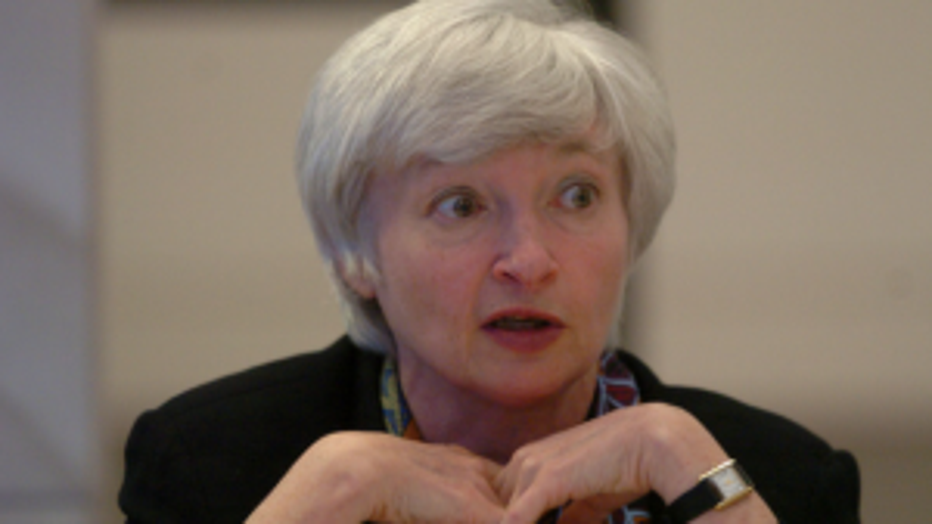Obama to nominate Janet Yellen to head Federal Reserve
By Jim Puzzanghera, Don Lee and Kathleen Hennessey
Los Angeles Times
WASHINGTON -- President Obama will nominate Janet L. Yellen to be the next head of the Federal Reserve, the White House said Tuesday. The historic appointment, if confirmed, would make the former UC Berkeley economist the first woman to lead the world’s most powerful central bank.

If confirmed by the Senate, economist Janet Yellin would be the first woman to run the Federal Reserve. (Photo: Dan Honda/Contra Costa Times)
Yellen, the Fed's vice chair, would replace Ben S. Bernanke, whose second four-year term as chairman expires Jan. 31. She would take over at a crucial time -- the central bank is gearing up to reduce its unprecedented support for the economy without damaging the fragile recovery.
Obama will announce the nomination at the White House on Wednesday afternoon, joined by Yellen and Bernanke.
The Fed's leadership and policy signals are being closely watched around the globe, especially in developing economies where many fear a too-rapid or poorly communicated pullback of stimulus would have severe consequences for global financial markets and the flow of capital.
The nomination was expected and culminates an unprecedented public campaign that included letters from congressional groups and extensive lobbying by economists and others in and out of Washington.
In naming Yellen, 67, a veteran central banker with a reputation as a consensus builder, Obama opted for consistency and a candidate favored by many economists and liberal Democrats. The president's top choice, former Treasury secretary Lawrence H. Summers, withdrew from the running in September in the wake of mounting political opposition.
Unlike Summers, a close former economic advisor to Obama, the president has had few personal exchanges with Yellen and initially seemed hesitant to appoint her in what he described as one of his most important economic policy decisions of his second term.
But after Summers' withdrawal, White House officials talked up Yellen's prospects on Capitol Hill as they sought to ensure she would pass the sometimes acrimonious and partisan confirmation process.
With more than a third of the Senate’s 55-person Democratic caucus having signed a letter in July urging Obama to nominate Yellen, she is expected to be confirmed. The Senate unanimously backed Yellen in 2010 to become the Fed’s vice chair, and she had served on the Fed board of governors under Chairman Alan Greenspan from 1994-97 as well.
But Yellen, a Democrat who was previously a top economic adviser to President Bill Clinton, could face resistance from Republican members who have opposed the Fed’s easy-money policies in recent years.
Yellen may also find tough questioning about her time as president of the Federal Reserve Bank of San Francisco from 2004-10, a period when she also was involved in the Fed's monetary policy decisions. Though Yellen raised early concerns about the risks banks were taking during the sub-prime housing boom, like most economists, she did not foresee the real estate's disastrous crash, which triggered the worst economic downturn since the Great Recession.
More recently, some have criticized Yellen as being too willing to risk an increase in inflation through aggressive monetary policy in a bid to reduce the high jobless rate. Though the focus on unemployment is popular with many Democrats, and many economists say she is right to lean that way in the current situation, Yellen has nonetheless been painted in some corners as soft on inflation, an inflation dove in Fed-speak.
In recent years, Bernanke and the Fed have been subjected to intense criticism and scrutiny over the central bank's policies. Bernanke, a Republican, was confirmed 70 to 30 in 2010 for his second term as chairman in what was the narrowest victory margin for a Fed chief in the central bank’s history.
As the Fed’s vice chair, Yellen has been a staunch supporter of the similarly soft-spoken Bernanke as he has gone to extraordinary lengths to stimulate the tepid recovery from the Great Recession.
Under Bernanke, the Fed has kept its benchmark short-term interest rate at near zero since late 2008. The central bank's balance sheet, or asset holdings, have quadrupled since mid-2008 to $3.7 trillion as the Fed has purchased Treasury bonds and mortgage-backed securities to pump money into the financial system.
Fed policymakers, including Yellen, had been expected to begin reducing one of the central bank’s key stimulus programs in September. But they decided that the economy, particularly the labor market, wasn’t strong enough to start tapering the $85 billion in bonds the Fed has been purchasing each month since September 2012 to lower mortgage rates and other long-term interest rates.
As well as being the first woman to lead the Fed since it was created 100 years ago, she would be the first vice chair to ascend to the top job.

